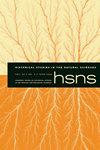The (Science Diplomacy) Origins of the Cold War
IF 0.3
3区 哲学
Q2 HISTORY & PHILOSOPHY OF SCIENCE
引用次数: 7
Abstract
The US monopoly of information regarding nuclear weapons was one of the distinctive features of the early Cold War. It encouraged US officials to bolster their country’s hegemonic role in post-war affairs, something that scholars have previously referred to in terms of “atomic diplomacy.” This paper shows that Cold War atomic diplomacy originated in an ancestral form of what we call today “science diplomacy,” distinctive of wartime allied relations during WW2. It first explores how science became a distinctive feature of wartime diplomacy by looking at agreements regarding exchanges of information and collaboration that shaped the relations between wartime allies (US, UK, and the Soviet Union). It then shows that their signing (and, at times, their rejection) eventually paved the way to conflicting views within allied administrations on what to share, making their officials less inclined to pool more knowledge toward the end of WW2. In conclusion, US monopolistic stances and atomic diplomacy originated in these disagreements, also marking the demise of wartime science diplomacy. This essay is part of a special issue entitled Science Diplomacy, edited by Giulia Rispoli and Simone Turchetti.(科学外交)冷战的起源
美国对核武器信息的垄断是冷战早期的显著特征之一。它鼓励美国官员加强其国家在战后事务中的霸权作用,学者们此前将其称为“原子外交”。本文表明,冷战时期的原子外交起源于我们今天所说的“科学外交”的祖先形式,这是二战期间战时盟国关系的特色。它首先探讨了科学如何成为战时外交的一个显著特征,通过观察有关信息交流和合作的协议,这些协议塑造了战时盟国(美国、英国和苏联)之间的关系。然后,它表明,他们的签署(有时,他们的拒绝)最终为盟军政府内部关于分享什么意见的冲突铺平了道路,使他们的官员不太愿意在二战结束时汇集更多的知识。总之,美国的垄断立场和原子外交起源于这些分歧,也标志着战时科学外交的消亡。本文是《科学外交》特刊的一部分,由朱莉娅·里斯波利和西蒙娜·图尔凯蒂编辑。
本文章由计算机程序翻译,如有差异,请以英文原文为准。
求助全文
约1分钟内获得全文
求助全文
来源期刊

Historical Studies in the Natural Sciences
社会科学-科学史与科学哲学
CiteScore
1.00
自引率
0.00%
发文量
24
审稿时长
>12 weeks
期刊介绍:
Explore the fascinating world of Historical Studies in the Natural Sciences, a journal that reveals the history of science as it has developed since the 18th century. HSNS offers in-depth articles on a wide range of scientific fields, their social and cultural histories and supporting institutions, including astronomy, geology, physics, genetics, natural history, chemistry, meteorology, and molecular biology. Widely regarded as a leading journal in the historiography of science and technology, HSNS increased its publication to five times per year in 2012 to expand its roster of pioneering articles and notable reviews by the most influential writers in the field.
 求助内容:
求助内容: 应助结果提醒方式:
应助结果提醒方式:


